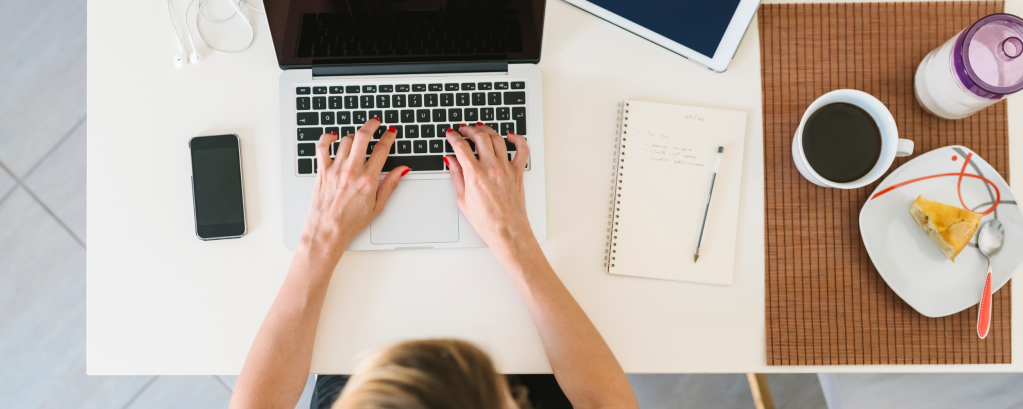The Science of Multitasking

In a world where our to-do lists never seem to get shorter, we are constantly thinking about all of the things we need to get done, and how to get them done as quickly and efficiently as possible. Whether it’s answering an email when on a Zoom call or packing lunch for the kids while scheduling a dentist appointment, multitasking has historically been a way for us to get more done in what little time it feels like we have in the day. But, is multitasking really helping us live up to our full potential, or is it actually killing our productivity and focus?
What Actually IS Multitasking?
 Multitasking is most commonly defined as “undertaking multiple tasks at the same time”. [1] That being said, most scientists who study human cognition and behavior agree that there are actually up to three different types of multitasking, and all present similar disadvantages to us when it comes to productivity and focus:
Multitasking is most commonly defined as “undertaking multiple tasks at the same time”. [1] That being said, most scientists who study human cognition and behavior agree that there are actually up to three different types of multitasking, and all present similar disadvantages to us when it comes to productivity and focus:
Performing two tasks simultaneously.
This is what usually comes to mind when we think of multitasking; engaging in activities such as talking on the phone and driving, answering emails during a meeting, and texting while walking down the street.
Switching from one task to another without completing the first task.
We’ve all been there – you’re finally in the zone and working on that important project when your coworker stops by your desk for a chat.
Performing two or more tasks in rapid succession.
It’s been proven that our brains need ample time to switch gears in order to work more efficiently and avoid errors when performing tasks, so hopping on an important work call immediately after meeting with your supervisor can definitely have an impact on productivity and focus.
 When it comes to any type of multitasking, we all like to think that we’re pretty good at it. In the age of “hustle culture”, multitasking is often labeled as a valuable skill; the more you can do at one time, the more efficient, hardworking and capable you are. However, it is estimated that only 2% of the population is actually able to multitask efficiently. [2] For the other 98% of us, a growing body of research has found that it is actually far less efficient to try to do two (or more!) things at once. What’s more, the research shows that multitasking is taking a toll on our mental and physical health.
When it comes to any type of multitasking, we all like to think that we’re pretty good at it. In the age of “hustle culture”, multitasking is often labeled as a valuable skill; the more you can do at one time, the more efficient, hardworking and capable you are. However, it is estimated that only 2% of the population is actually able to multitask efficiently. [2] For the other 98% of us, a growing body of research has found that it is actually far less efficient to try to do two (or more!) things at once. What’s more, the research shows that multitasking is taking a toll on our mental and physical health.
What Happens When We Multitask?
 To understand why multitasking doesn’t really work and why it can be harmful for us, we need to understand what happens to our brains when we try to juggle too many things simultaneously. According to Kevin Paul Madore, a neuroscientist at Stanford University, when we multitask, we are creating interference between several brain networks that deal with attention and cognitive control. These networks begin talking over each other and pulling your mind in different directions, which can lead to delays and mistakes when attempting to complete a task. [3] Plus, according to neuropsychologist Cynthia Kubu, PhD, even when we think we’re multitasking, most often we aren’t actually doing two things at once. Instead, we’re doing individual actions in rapid succession, also known as task switching,” she says. [4] According to research published in the Encyclopedia of Neuroscience, task switching requires a high level of cognitive processing which can ultimately lead to a slower and more error-prone performance. [5]
To understand why multitasking doesn’t really work and why it can be harmful for us, we need to understand what happens to our brains when we try to juggle too many things simultaneously. According to Kevin Paul Madore, a neuroscientist at Stanford University, when we multitask, we are creating interference between several brain networks that deal with attention and cognitive control. These networks begin talking over each other and pulling your mind in different directions, which can lead to delays and mistakes when attempting to complete a task. [3] Plus, according to neuropsychologist Cynthia Kubu, PhD, even when we think we’re multitasking, most often we aren’t actually doing two things at once. Instead, we’re doing individual actions in rapid succession, also known as task switching,” she says. [4] According to research published in the Encyclopedia of Neuroscience, task switching requires a high level of cognitive processing which can ultimately lead to a slower and more error-prone performance. [5]
How Does Multitasking Make Us Less Efficient?
To better understand the inefficiency of multitasking, scientists have examined switch costs, or the cost of lost time when task switching. [6] In 2001, Joshua Rubinstein, PhD, Jeffrey Evans, PhD, and David Meyer, PhD conducted four experiments in which young adults switched between different tasks of varying complexity and familiarity; in all four experiments, the participants lost time when they had to switch from one task to another, no matter how simple or familiar the tasks were. To make matters worse, the amount of lost time increased as the tasks became more complex. Even relatively small switch cost times (sometimes even just a few tenths of a second) can eventually add up the more one switches from task to task, and can cost as much as 40% of someone’s productive time! [7] The bottom line is, taking on too much at once is definitely not helping you get your daily to-do list done any more efficiently, and, in fact, may be slowing you down.
How Does Multitasking Impact Our Health and Wellbeing?
 While it’s surprising to discover that multitasking doesn’t make us more efficient, it’s even more surprising to learn that it may also have an adverse effect on our health. Remember those brain networks we discussed earlier? The research shows that messing with them – by doing things like multitasking – can lead to cognitive problems with memory and focus, and even have long term impacts on our mental and physical health.
While it’s surprising to discover that multitasking doesn’t make us more efficient, it’s even more surprising to learn that it may also have an adverse effect on our health. Remember those brain networks we discussed earlier? The research shows that messing with them – by doing things like multitasking – can lead to cognitive problems with memory and focus, and even have long term impacts on our mental and physical health.
When you have a busy day juggling multiple different tasks, assignments and activities, you aren’t giving your brain a chance to consolidate important memories, which can lead to forgetfulness. Research conducted by scientists at Stanford University found that too much multitasking can lead to lapses in memory, and that chronic, everyday multitasking can be connected to errors in our working memory (our ability to use and hold information temporarily) and our long-term memory. [8] This same research also found that media multitasking (activities such as texting and watching TV, or participating in a Zoom meeting while simultaneously responding to Slack messages) can have even more negative effects. People who are frequent media multitaskers are generally worse at continuously maintaining their attention on a task, and are more likely to have task-irrelevant thoughts, or mind wandering. When it comes to our physical and mental health, some studies have found that multitasking can increase negative emotions such as irritability and impatience, and even lead to chronic stress (which increases blood pressure and heart rate – two things that can definitely affect our physical health over time!), anxiety, and depression. [9] One study showed that individuals who are chronic multitaskers have smaller brain volumes in an area of the brain known as the cingulate cortex, which is important for regulating emotions and behavior. So while forgetting to switch the laundry may not actually seem like a big deal in the grand scheme of things, it really can have an impact on our health in the long run.
The Takeaway…
We now understand why trying to do multiple tasks at once, especially complex tasks, can negatively affect not only productivity, but also longer term health and well-being. And while dropping a glass while cooking or accidentally sending an email to the wrong recipient isn’t life-or-death, texting a friend while switching lanes on the highway can be. It turns out that humans are actually wired to be mono-taskers. So, slow down, take a moment, and focus (click HERE for some focus hacks) – your brain will thank you for it.
Learn more about mono-tasking HERE, and take our quiz to determine how focused you really are HERE.
[1] Adler & Benbunan-Fich, 2013, p. 1441; Rubinstein et al., 2001
[2] https://www.newyorker.com/science/maria-konnikova/multitask-masters
[4] https://health.clevelandclinic.org/science-clear-multitasking-doesnt-work/
[5] https://www.sciencedirect.com/topics/psychology/task-switching